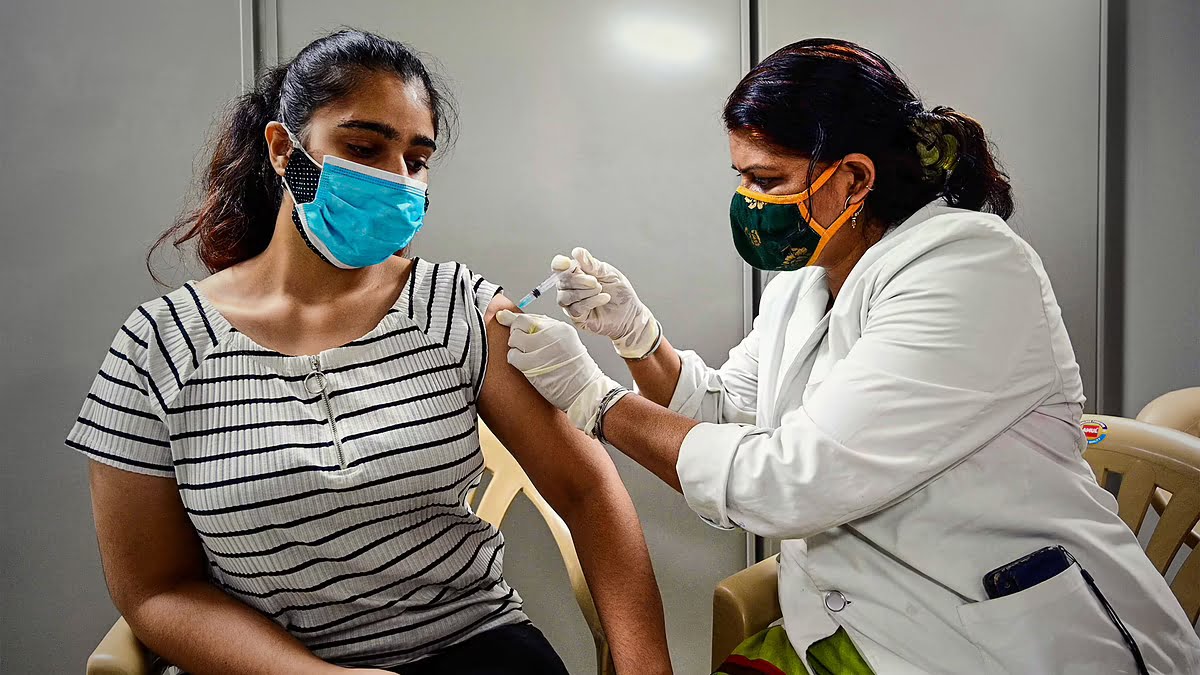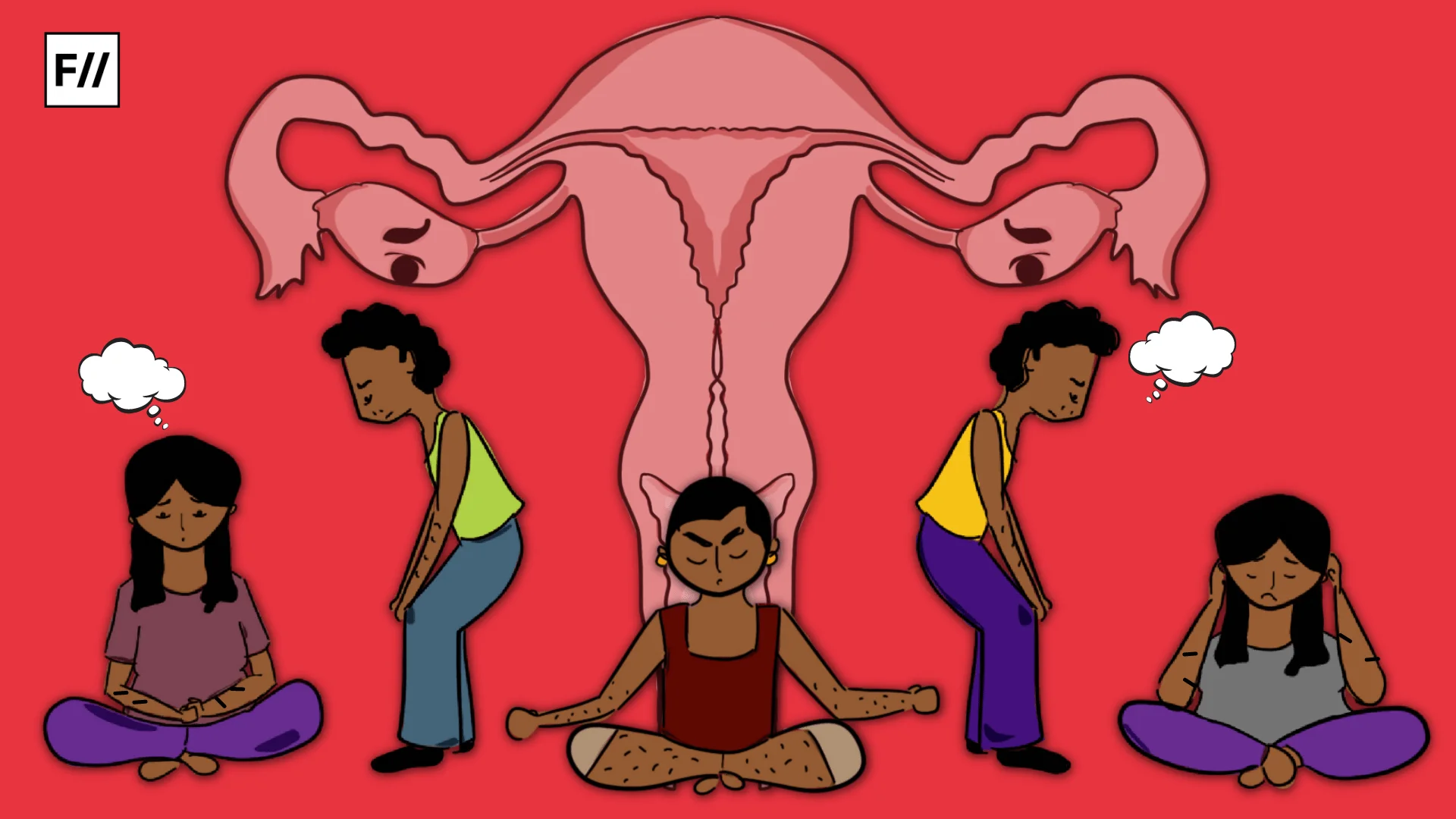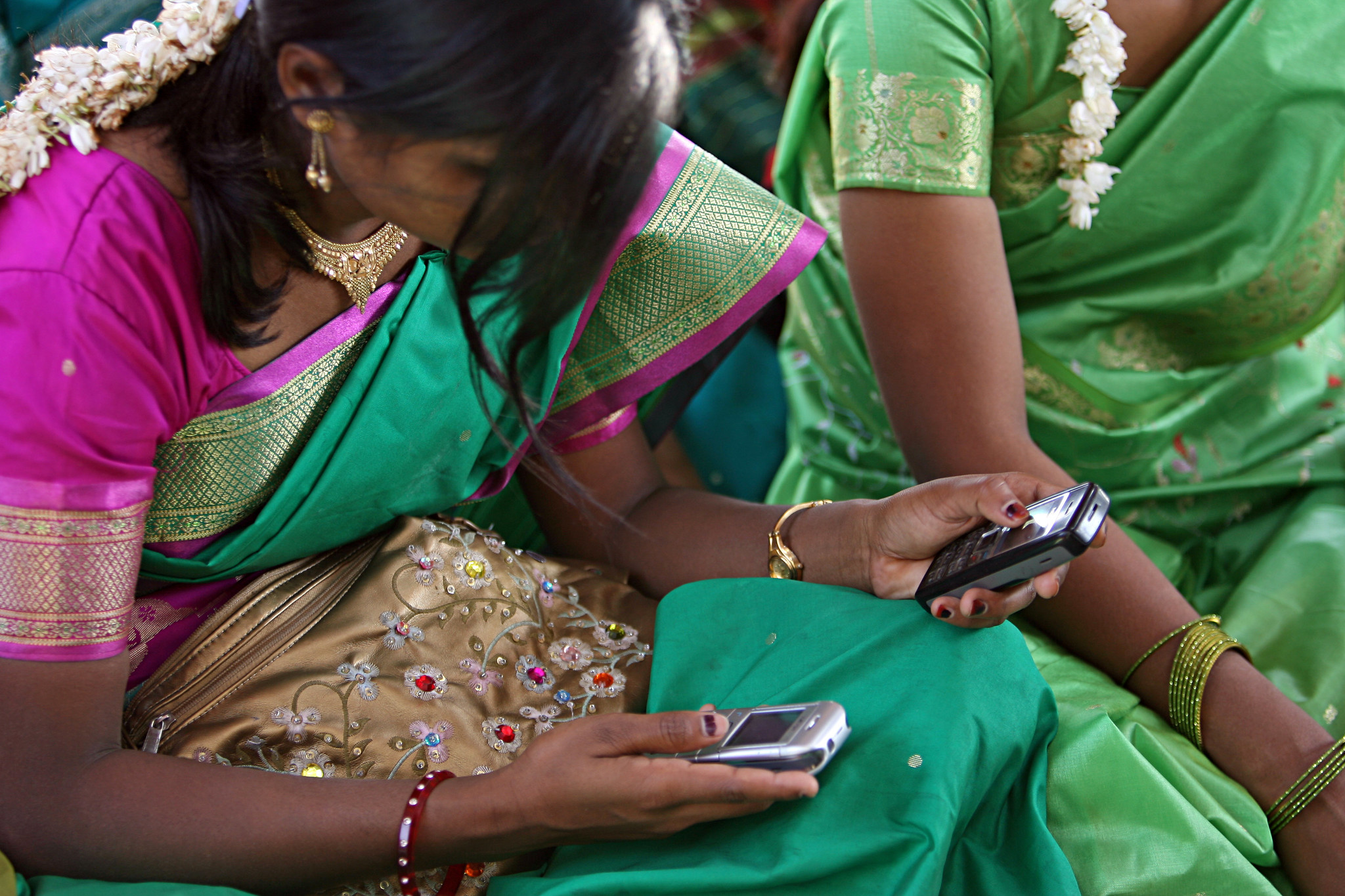“I had two periods in one month after getting vaccinated in a span of 15 days. The first period was on time.”
“My period was late by 110 days, and this was induced by progesterone tablets! God knows how much longer I would’ve had to wait without the medicine.”
“In a gap of 84 days which is the gap between the first dose and the second dose, I got my periods once (once in 3 months). After the second dose, I missed my period and it has been 3 months now.”
These are just some of the responses of cis women, who responded to a survey by Feminism in India, when asked if or how the COVID-19 vaccine affected their menstrual cycles. While the general population has been warned of side effects of the vaccine including fever, headache and chills, what has been missing from the discourse largely is the impact the vital jabs could have on menstrual health.
Even though people who menstruate make up a significant part of the population, the mainstream dialogue around menstrual, sexual and reproductive health continues to be sparse. This is especially the case in India, where the conservative and often, the regressive approach of the general society is such that these topics are barely discussed in the open. Naturally, this has enabled fake news such as the vaccine is harmful to pregnant and lactating women and conspiracy theories to spread like wildfire. This has, in turn, added to the gender gap in India’s vaccination drive.
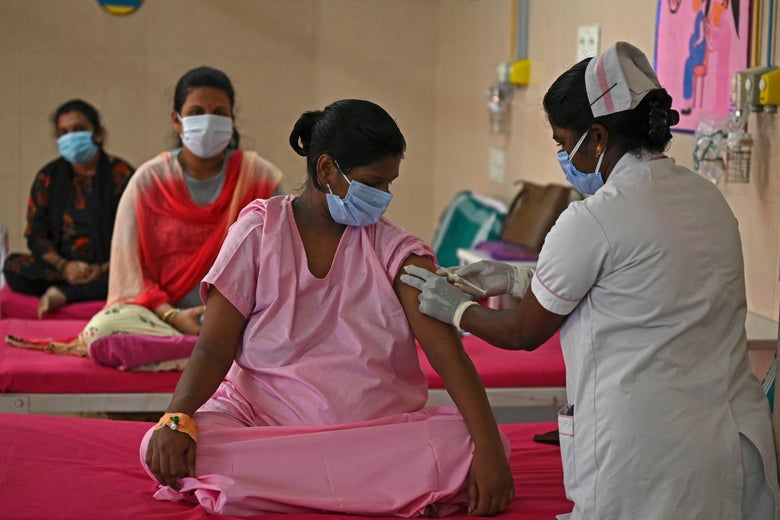
Even though people who menstruate make a significant part of the population, the mainstream dialogue around menstrual, sexual and reproductive health continues to be sparse. Naturally, this has enabled fake news such as the vaccine being harmful for pregnant and lactating women and conspiracy theories to spread like wildfire. This has, in turn, added on to the gender gap in India’s vaccination drive.
Also read: Women Worst Affected By Unemployment During COVID-19
However, anecdotal evidence gathered from across the globe indicates that the vaccine impacts how people experience menstrual cycles, albeit for the short term. This is also indicative of the androcentric assumption of a cis male body as the template of society and thus, the invisibilisation of other gendered bodies in the process. Delving a little deeper, this further marginalises the anxieties of a large population that deals with menstrual conditions such as PCOS (Poly Cystic Ovarian Syndrome).
Instead, medical experts have also, time and again, attributed menstrual irregularities to factors such as the stress of surviving a global pandemic and health crisis, and the trauma of having witnessed the loss of life and health of loved ones, among others. Meanwhile, there has been no official research so far into the impact of vaccines on menstrual cycles. Given how our society is still aeons away from discussing menstruation without getting uncomfortable and twitchy, it does not come as a surprise that menstrual irregularities following the COVID-19 vaccine remain largely unresearched. This further comments on how medical sciences have historically dismissed women’s experiences of ill health. Their complaints were largely brushed aside as ‘hysteria’, a condition believed to be caused by a “wandering uterus/sexual frustration”.

However, in an attempt to demand more research into the impact of vaccines on the sexual and reproductive health of menstruating bodies, in September 2021, Feminism in India conducted a survey, gathering responses from at least 25 women. They confirmed the vaccine affected their menstrual health and over 70 percent of the responses from those diagnosed with PCOS. From getting two periods in a month, extremely painful cycles to getting their period after six months within two days of getting vaccinated: the reported effects have been varied yet concerning.
25-year-old Sweta was not getting her periods for six months. This was until 24 December 2020, when she got her first dose of the COVID-19 vaccine in Dubai (The UAE started the vaccination drive in December last year). Two days later, she got her period, “Heavy flow and lasted for ten days,” the marketing executive described to us.
Natasha, a 26-year-old NGO professional based in Chhattisgarh, says that after she took the vaccine in May, her period was delayed by two and a half months. 29-year-old Anvi, working in Delhi, had a harrowing experience.
“I took Covaxin, hence there was only a month difference between the two jabs. After the first one, I did not get my period. After the second one, I got my period after a few weeks and I bled for close to 20 days. I was bleeding for 20 days straight and the gynaecologist could not figure out why, as my sonography did not have any signs of PCOS or anything. Yet, he said there must be slight PCOS symptoms and if I don’t take care of myself now, I could develop severe issues in the future. He put me on hormones to stop the bleeding. But, everything was okay next cycle onwards.”
Anvi added that because the blood flow was too heavy, she had got very weak. She also recently got diagnosed with slight PCOS. Anvi began to take medicines to control the bleeding, during which she also began to experience heightened levels of anxiety. Studies indicate that people diagnosed with PCOS are at least three times more at risk of being diagnosed with anxiety and depression.
26-year-old Maryanne has been struggling with PCOS for ten years now. While she managed to regulate her period cycles through dietary and lifestyle changes, taking the vaccine in January 2021 led to her period getting delayed by two months. “Having my cycle become messed up again brought with it the added worry of fertility since my husband and I intend on trying for a baby in the next few years. I had a similar experience with my cycle when I had the second dose in March 2021. However, my cycles have managed to fall back into a routine now,” she added.
Also read: The Global COVID-19 Vaccine Roll-Out Shows The Lack Of Research On Women’s Biology
One of the effects many women diagnosed with PCOS deal with is struggling to conceive. While medical experts have assured that the effects of the vaccine on menstrual cycles are definitely not long-term, within the population of menstruators, the anxieties of another subset that is diagnosed with conditions such as PCOS, get further dismissed. Research into the impact of the vaccine will, therefore, be not enough if the impact on people diagnosed with PCOS is not considered.
One in five women have been struggling with PCOS and some of the common effects are irregular periods, increased mental health struggles, etc. Hence, it is pertinent that research addresses vital questions around how vaccine has interfered with the menstrual cycles of a person diagnosed with PCOS.
One in five Indian women have been diagnosed with PCOS and some of the common effects are irregular periods, increased mental health struggles, etc. Hence, it is pertinent that research addresses vital questions about how vaccine has interfered with the menstrual cycles of a person diagnosed with PCOS. 25-year-old Arundhati Misra says that she was diagnosed with PCOS and was already experiencing irregular periods as a result, but after the vaccination, her symptoms got worse and she missed her period for three consecutive months for the first time. For 25-year-old Alisha Gonsalves from Pune, taking the vaccine triggered PCOS symptoms such as weight gain, bloating, mood swings and an increase in body hair. Her period got late by at least three months. For Christie, another respondent with PCOS, her delayed period was accompanied by terrible side effects such as nausea, vomiting and pain.
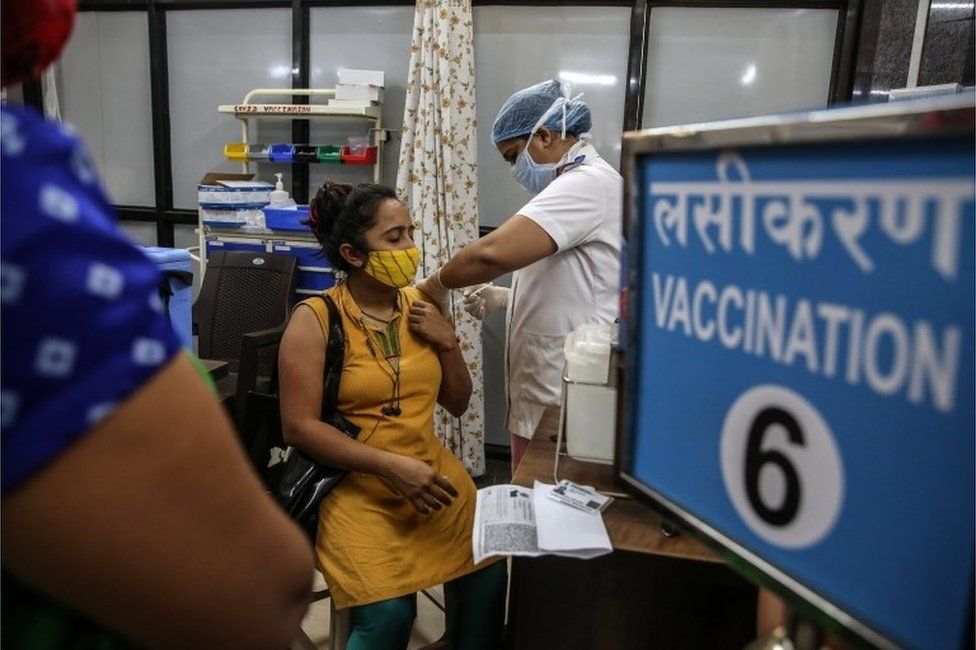
Several women who took part in FII’s survey also described how they experienced a change in their blood flow. While some experienced heavy and draining periods ranging from two weeks to 20 days, a respondent described her period as thin and watery, another as light and that ‘mimicking spotting’, and yet another respondent experienced a ‘dark red-blackish discharge’ two days after she got the vaccine. A respondent also experienced more clots than usual in her period following the jab.
However, this should not deter women from taking the vaccine, urges obstetrician and gynaecologist Dr Suchitra Dalvie (MD MRCOG of Asia Safe Abortion Partnership (ASAP)). Speaking to Feminism In India, Dr Dalvie said that there is no evidence that the vaccine affects one’s menstrual cycle even though some anecdotal experiences are possible. “However, there is no study to validate that. There is also no scientific reason why it should affect. It has also been approved for use in pregnancy. So it’s safe and people should not worry,” she said.
It has been less than a year since the vaccine has come into existence, so there may be things we do not know yet but safety protocols have been rigorous before the vaccine was approved, she said hoping these stories do not scare anyone from taking the jibe.
Yet, medical experts urging for research believe that recognising and establishing any relationship between the vaccine and menstrual cycles could, infact, prove to be helpful. Not only might it help one plan their vaccination better, putting accurate information out instead of keeping the people in the dark about what is happening to their bodies, could in fact help dissipate fears around the vaccine.
Yet, medical experts urging for research believe that recognising and establishing any relationship between the vaccine and menstrual cycles could, in fact, prove to be helpful. Not only might it help one plan their vaccination better, but putting accurate information out instead of keeping people in the dark about what is happening to their bodies, could in fact help dissipate fears around the vaccine.
Featured image source: Newslaundry
About the author(s)
Soumya is a Masters graduate in gender from Jamia Millia Islamia & has a PG Diploma in New Media from Asian College Of Journalism. She is learning to unlearn and question patriarchal structures with empathy. She has taken an interest in gardening but has over-watered and killed two plants already. This may or may not be a metaphorical reference to how she deals with life.
